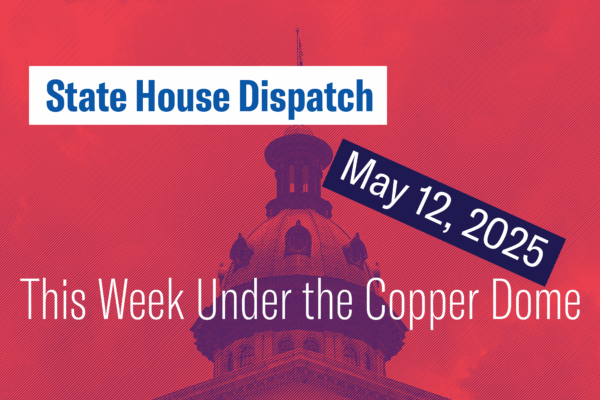On Thursday of last week, the South Carolina General Assembly stopped debating bills for this calendar year. For better or worse, almost any bill that hasn't passed both chambers now will be held over until January 2026, when the second half of the 2025-2026 legislative session begins.
But summer break isn’t quite here yet. This week in the State House Dispatch, let’s look at what lies ahead for budget talks, the bills that are getting carried over, and what you can do to stay engaged in the process.
If you’re looking for a longer discussion about where things stand after a difficult legislative session, we’ll be releasing a new episode of the While I Breathe podcast soon, recapping what happened and previewing what’s to come. You can subscribe for free wherever you listen to podcasts.
Get involved (or stay involved) this summer
Members of our Advocacy team plan to hit the road this summer and spend time with dedicated advocates around the state. They’re also planning some events to train volunteers, connect constituents with their lawmakers, and build momentum for positive change in the State House.
If you haven’t already, consider filling out our Volunteer Form. Select which issues matter the most to you, and we’ll let you know when there are opportunities to show up, speak out, and support civil liberties with our fellow South Carolinians.
Bills to watch in 2026
The May 8 deadline, known by the Latin name sine die, is when a lot of State House watchers breathe a sigh of relief. Some of the worst and most harmful bills introduced this year are on hold for now. So are some positive bills that we would have loved to see pass in 2025.
Lawmakers from the freedom-hating State Freedom Caucus Network are trying to change that. They’ve introduced several “sine die addition” bills that would allow the Legislature to keep debating bills on certain topics after sine die, including immigration (H. 4548), abortion (H. 4549), forced party registration for primary elections (H. 4550), and prohibitions on life-saving vaccines (H. 4545). Given the ongoing friction between Freedom Caucus members and their host Republican Party, it seems unlikely that these measures will pass, but we’ll keep an eye out.
In the meantime, you can do some reading on the bills that will be up for debate when lawmaking resumes in earnest in January 2026. Because of a change in the “crossover” rules this year, bills will still be live next year even if they didn’t get a subcommittee hearing in 2025. That includes some positive bills like the Freedom to Read bill (H. 4059) and a bill that would remove eviction filings from public court records after a set time period (H. 4270).
For a look at some other bills that could affect your civil liberties in 2026, check out the Legislation page on our site.
Legislating via the budget
It’s been said that a budget is a moral document. It reveals the moral priorities of the people who wrote it. As lawmakers spend time this week deciding how to spend upwards of $40 billion in the next fiscal year, we’re going to learn a few things about their skewed version of morality.
While bills aimed at taking away our civil liberties are paused, some lawmakers will still try to impose their will via the state budget, skipping the usual law-making process and skirting public debate. Their most common tools for accomplishing this are one-year rules in the state budget known as “provisos.”
For example, rather than go through the subcommittee, committee, and floor debates in two chambers to pass a bill prohibiting Diversity, Equity, & Inclusion programs, some lawmakers this year have tried slipping a DEI prohibition into the state budget. Another proviso proposed by Sen. Josh Kimbrell threatens to strip state funding from the City of Columbia because of a city ordinance that bans anti-LGBTQ “conversion therapy” by licensed providers within city limits.
Unfortunately there is no public comment period during budget debates, so you won’t have an opportunity to weigh in as lawmakers propose these and other budget amendments. You can still contact your state lawmakers, though, and let them know about your priorities.
Members of our Advocacy team will stay on top of the budget process this week, and if there are any calls to action, we’ll share them via our social media accounts (Facebook, Instagram, Bluesky, Threads, and Twitter). In the meantime, you can use our message form to let your lawmakers know you’re in favor of Diversity, Equity, and Inclusion.


